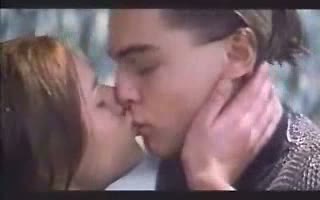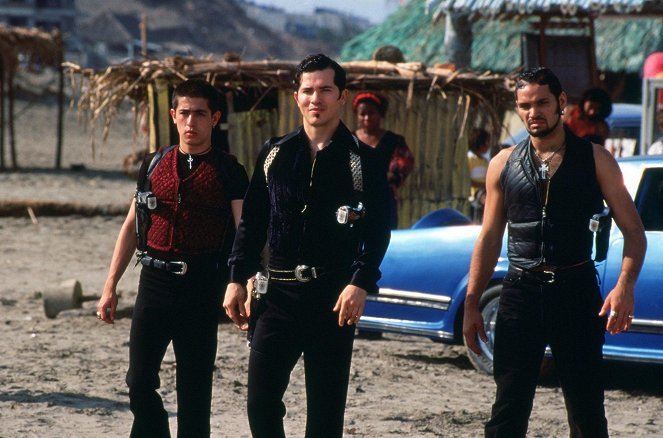Directed by:
Baz LuhrmannCinematography:
Donald McAlpineComposer:
Craig ArmstrongCast:
Leonardo DiCaprio, Claire Danes, Zak Orth, Jamie Kennedy, Dash Mihok, John Leguizamo, Paul Sorvino, Brian Dennehy, Vondie Curtis-Hall, Paul Rudd (more)Plots(1)
Baz Luhrmann's dazzling and unconventional adaptation of William Shakespeare's classic love story is spellbinding. Leonardo DiCaprio and Claire Danes portray Romeo and Juliet, the youthful star-crossed lovers of the past. But the setting has been moved from its Elizabethan origins to the futuristic urban backdrop of Verona Beach. This brilliant and contemporary retelling of the worlds' most tragic love affair makes this wildly inventive "Romeo and Juliet" unforgettable. (official distributor synopsis)
(more)Videos (1)
Reviews (7)
The first Luhrmann film that’s bothered me with its superficiality. That fabled need for visual masturbation was present in this case too, of course, but it doesn't work in any positive way, because this time it's too "colorized", insanely over-stylized altogether, and some of the characters are at the very least begging for a beating (the opening scene at the gas station is the height of awkwardness and I had a strong urge to turn it off... ) Fortunately, it's then saved by Leo and Claire, whose intimate scenes are quite successful, but considering that the source material is the great William Shakespeare, there was tragically little emotion for my taste. The soundtrack was ok, the level of the visuals was not great for Luhrmann, the emotions were lacking, the central duo was all right. But overall nothing more than average.
()
The film that was a gift to me from Baz Luhrmann and Claire Danes. And an incredible treasure that is not for everyone, to my immense pleasure. From the machine gun editing and intoxicating zooms at the gas pumps to the grand interpretation of the most romantic story the world knows – this is pure art.
()
Luhrman created a captivatingly timeless adaptation of an immortal classic. His version is not the insane plan of an unreasonable formalist, but rather an inventive reflection of Shakespeare and the principles of Elizabethan theatre. He directly stated that his aim was to shoot Romeo and Juliet in the manner that the bard himself would have done it if he’d had access to film. Let’s at last leave aside the distorted view of Shakespeare – that he was an untouchable genius – that has been beat into our heads since elementary school. His mastery consists in the fact that he was able to appeal to all layers of Elizabethan theatre, where the upper crust came into contact with ordinary people (albeit in separate sectors of the playhouse) and at that time it was mere entertainment whose competition was murder ballads and jugglers. Shakespeare was simply the era’s leading pop-author, who constructed even his most fragile romance as a roller coaster of emotions, where the infatuation and clarity of great love at first sight run up against a humorous perspective (it is too often forgotten that this is not about first love and Romeo’s broken heart from a previous relationship is superbly commented upon by other characters), dramatic conflicts, bombastic skirmishes, heart-rending tragedy, exaggerated wisdom and delicate declarations of emotions. Furthermore, all of this is accompanied by dialogue in which new love is carried to romantic heights, but does not look beyond its physical dimension. Luhrman was able to create an ideal framework for Shakespeare's verses by bringing the story into a hyper-stylised and kitschy overwrought world reminiscent of music videos, where the aesthetics of the wealthy’s tastelessness are blended with the sweatiness of beach bums and the self-adoring pomposity of hip-hop videos. Like the libretto, the film’s style perfectly mixes together kitschy wisdom, tense theatricality and fragile emotions. The genius of Luhrman’s approach consists in the roughly half-hour introduction, when he literally hurls viewers into a tempest of total passion, which, however, lays the groundwork for the subsequent soothing of the romantic passages, whose sincere youthful naïveté is not such an assault on the eyes. At the same time, the small details (especially in the characters’ gestures – see, for example, Juliet’s entrancing initial sequence with her mother) and the fresh approach give new life to the classic and makes it exactly what it is supposed to be – a story for teenagers. Not an insipidly superficial story as when cynical adults and eternal adolescents make films for teenagers such as American Pie, but rather an absolutely empathetic story that understands the agitated emotional state of youths and the feeling that one is the star of one's own video or film, as John Hughes superbly managed to capture. Under Luhrman’s direction, DiCaprio and Danes created what is indisputably the best version of the star-crossed lovers ever. The scene in which they first meet abounds with mutual enchantment, romantic fragility and adorableness, as well as the horniness that is usually omitted elsewhere. After more than twenty years, the film still works just as perfectly and seeing it in the cinema was a dream come true and proof of its qualities – while at the beginning viewers fidget and laugh at the pompousness of the entourages of the Capulets and Montagues, the next two hours are filled with alternating emotions, enchantment, amusement and emotional tension, and at the very end in the church, you could hear a pin drop and the tension could be cut with a knife. Luhrman simply managed to fulfil the master's words: After all, eternally will the heart receive Juliet’s grief and Romeo’s pain.
()
(less)
(more)
Clearly the strongest aspect here is the beautiful (!!!) music. Hearing it must make all love look beautiful. The other win is of course young DiCaprio and partly Claire Danes. But I can't give much more praise than that. The setting of the amazing and familiar romantic story of Romeo and Juliet this time almost didn't work for me at all. Although I understand that it’s probably more palatable for the younger generation this way. 3 stars.
()
Luhrmann's version of Romeo + Juliet eluded me for a long time. While DiCaprio was fastidious before Titanic, Danes was simply pure, and the modern setting and grittier fights worked out well. I also liked the shattering of the classic balcony scene, but what I didn't like was the combination of modernism and Shakespearean language. I'd rather watch West Side Story.
()




Ads